Last Updated on November 26, 2023 by Cathy
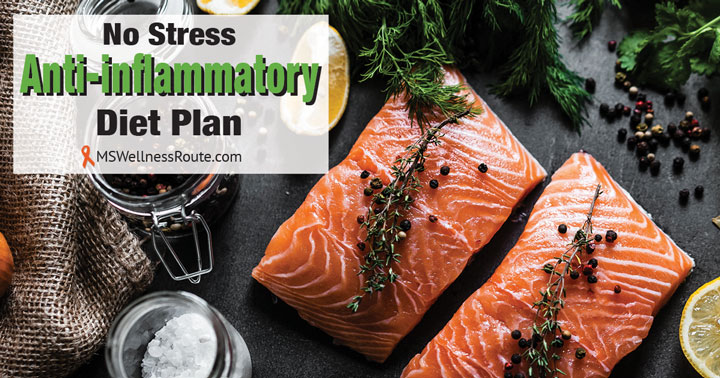
Multiple sclerosis (MS) is a chronic inflammatory disease attacking the central nervous system. Choosing an anti-inflammatory diet plan can help stop the progression of MS. MS can lead to severe cognitive and/or physical disabilities including neurological defects. The exact cause of MS is unknown. But, it’s believed genetic predisposition and environmental factors can trigger it.
Researchers discovered people with MS have more bad gut bacteria than healthy people. In other words, they have less good gut bacteria. Studies showed dietary changes improve gut bacteria and the progression of MS.
Why do people with MS have more bad bacteria in their gut?
There are many factors that can lead to an unbalance of gut bacteria. Such as a high-sugar diet, antibiotics, stress, or not enough sleep. Avoiding processed foods, omega-6 fats, and foods high in sugar is extremely important. These foods kill the good bacteria and feed co-infections. Such as bacterial and yeast overgrowth, parasites, and mycotoxins.
Eating an anti-inflammatory diet will lower your inflammation and improve your immune system. When you first start out it can feel a little overwhelming and leave you wondering what can you eat. But there are lots of fresh, healthy foods that you can eat. Learning what you can and can’t eat is the key to success. What you eat affects not only your gut but your immune system and overall health.
Foods to eat include:
- Vegetables
- Fruit
- Healthy fats
- Herbs
- Nuts
- Seeds
- Wild-caught fish
- Pasture-raised poultry
- Grass-fed and finished meats
- Multiple Sclerosis Diets
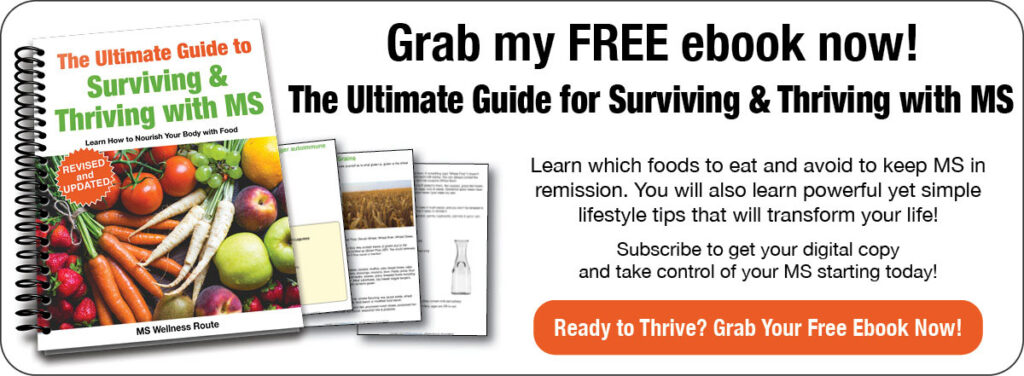
Preparing for the Anti-inflammatory Diet Plan
When I first changed my diet back in 2004 there wasn’t a lot of information. Today, there is a lot of information, almost too much information. There are many different diets for MS making it hard to know which one is best.
I’ve been on many of these diets trying to find the perfect one to reverse all of my symptoms. What I discovered is there is no perfect diet. But, they all have something in common and that is to lower your inflammation.
Since everyone is different you need to adjust whatever diet you are on to fit your needs. For example, what triggered my MS was too many rounds of antibiotics and fungi. I followed The Wahls Protocol but combined it with a candida diet.
I also followed the recommendations in the book Healing Multiple Sclerosis by Ann Boroch. So I ate a paleo diet and avoided foods high in sugar, mold, mercury (tuna), and parasites (pork). After three months I noticed my heat intolerance disappeared. I couldn’t believe it and tested it over and over. Even to this day, I’m still amazed that it is gone.
I won’t lie, it is hard and you have to be very strict. I’m not saying it can’t happen because it can. If my heat intolerance disappeared it could happen to you too.
Anti-inflammatory Diets
The best anti-inflammatory diet to follow is the one that best fits your needs. If you have MS you probably also have a leaky gut. That’s when the gut lining separates and undigested food and toxins to pass through.
Preparing and having a plan for an anti-inflammatory diet makes it much easier. It can get expensive but it is worth the investment for your health. The key is to keep it simple and enjoyable.
Diets for MS:
- Best Bet Diet
- Fasting mimicking
- Ketogenic
- Mediterranean
- Overcoming MS (OMS)
- Paleolithic (paleo)
- Swank
- The Wahls Protocol
Gluten is another concern for people with MS because it increases gut permeability. Some people can handle non-gluten grains but others can’t due to cross-reactivity. If your body recognizes gluten as an antigen your immune system makes antibodies.
Sometimes, those antibodies get confused and target non-gluten grains. Then your immune system kicks in. It starts attacking it with inflammatory chemicals raising your inflammation. Dairy, oats, and yeast are other foods the immune system often confuses with gluten.
It’s best to remove all grains to get your inflammation down and calm your immune system. Later, you can reintroduce these foods, one at a time, to see if your body reacts. If it does you need to remove these foods until you have healed your gut completely.
Eat More Vegetables
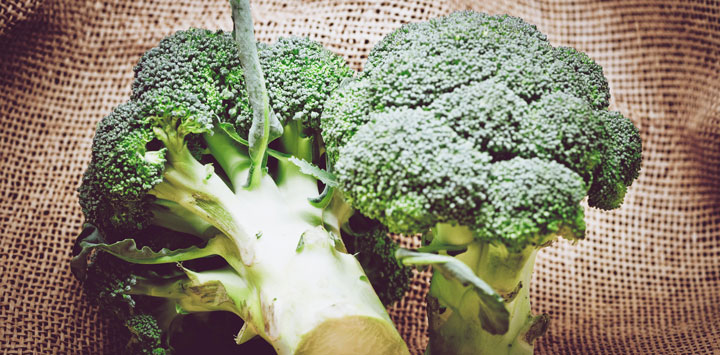
Unfortunately, most people don’t eat enough vegetables. But, vegetables and fruit provide antioxidants, fiber, and nutrients to support optimal health. They fight cellular damage and benefit the digestive system keeping inflammation levels down.
Dr. Terry Wahls, the author of The Wahls Protocol, recommends eating 9 cups of vegetables every day. I know it sounds like a lot but it’s actually not hard. Two cloves of garlic equals one cup and when you cook leafy greens they shrink making it easier to eat.
Dr. Wahls recommends 3 cups of each:
- Leafy greens
- Sulfur (asparagus, broccoli, cabbage, onions, etc.)
- Colorful all the way through (beets, carrots, berries, etc.)
Choose Good Quality Meats
As the saying goes – you are what you eat. Conventional meats include grains, soy, antibiotics, and growth hormones. If you can it’s best to buy non-conventional meats.
Meats to buy:
- Wild-caught fish
- Pasture-raised poultry (chicken, duck, turkey, etc)
- Grass-fed meats (beef, bison, lamb, pork, etc.)
- Game meat (deer, elk, rabbit, wild boar, etc.)
Eat Healthy Fats and Oils for Omega-3s
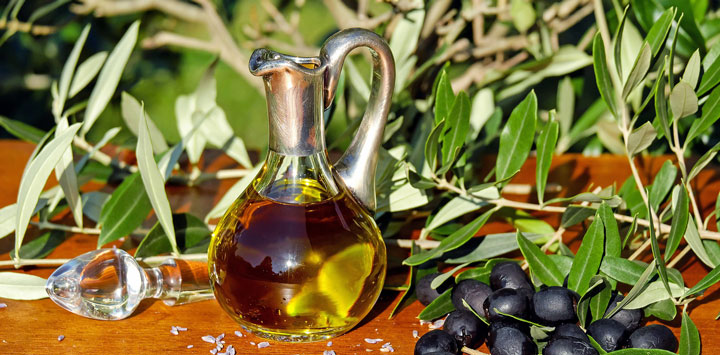
The typical Western diet includes fats that are higher in omega-6. You should be eating more omega-3 fats than omega-6 fats because they are pro-inflammatory. Plus, they help to rebuild your myelin. However, be careful to not eat a high-fat diet.
Healthy fats and oils:
- Avocados
- Chia seeds – butter and oils
- Coconut oil
- Duck fat
- Flaxseeds – butter and oils
- Lamb fat
- Lard (pork fat)
- Nut butters and oils (macadamia, walnut, etc.)
- Olive oil
- Salmon
- Sardines
- Tallow (beef fat)
- Tuna
Support Your Gut
Heal your gut by eating foods high in fiber. Such as raspberries, pears, broccoli, and turnip greens. High-fiber foods reduce inflammation. It also promotes a healthy gut and helps with your digestive system.
Many people with MS suffer from constipation due to the lack of movement. Eating a high-fiber diet helps to move bacteria and other buildups out. Unfortunately, most people don’t eat enough fiber, it’s best to start slow and work your way up.
Probiotics and Prebiotics
Fermented foods like coconut yogurt, kimchi, and sauerkraut are probiotics. They add healthy bacteria to your gut. Prebiotics are foods that feed the probiotics to help them multiply. High-fiber fruits and vegetables are a great source of prebiotics.
Herbs
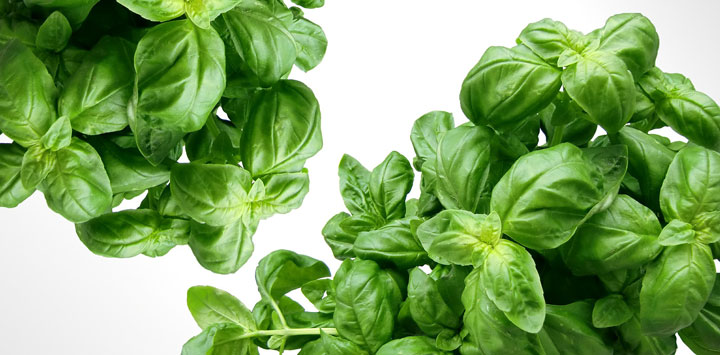
Herbs are very flavorful for any dish on an anti-inflammatory diet – plan on using them often. Plus, they include antibacterial, antioxidant, anti-inflammatory, and neuroprotective properties. MS is a neurodegenerative disease. There are many herbs to choose from to enhance the flavor of your meals.
Herbs are expensive but they are easy to grow and less expensive. You don’t need a huge space to grow herbs, you can grow them in smaller pots in your kitchen. Try herbs like cinnamon, ginger, oregano, rosemary, and turmeric.
Drink Plenty of Water
It is important to drink plenty of water to stay hydrated and to flush out toxins. Many people with MS suffer from bladder issues so they don’t drink enough. Oftentimes urinary urgency is due to a urinary tract infection caused by bacteria.
Water is very refreshing. Especially when you’re thirsty but it’s amazing how many people don’t drink enough water. If it’s because your water doesn’t taste good consider buying a water filter. You don’t need to buy an expensive system. One that hooks to your faucet or sits on your countertop works just as well.
I’m on a well and we had it tested many times. It always comes back with good marks and it tastes great. But I still use a water filter that sits on my countertop. The brand I have is PUR Classic Water Filter Pitcher.
If you need something more than “boring water” try adding some fruit or herbs. It helps to boost the flavor and it adds an anti-inflammatory benefit. If you suffer from urinary urgency drink small amounts of water throughout the day.
Fruits and herbs to boost the flavor of water:
- Blueberries
- Cucumber
- Lemon
- Lime
- Mint
- Orange
- Pineapple
- Rosemary
- Strawberry
- Watermelon
Try blending different fruits with herbs like raspberry and lime. Try and come up with your own favorite combination. Clean, pure water is good for you, and adding a little flavor can make it even better.
Buy Organic
Eating more fresh fruits and vegetables is the most important dietary change. As you are increasing your produce intake you’re also eating more pesticides. That is unless you buy organic produce. Yes, organic produce costs more but isn’t your health worth it? If it’s not always possible to buy organic buy it if it’s on the Dirty Dozen list.
The “Dirty Dozen” refers to a list of twelve fruits and vegetables that, when conventionally grown, tend to have higher pesticide residues. This list is annually compiled by the Environmental Working Group (EWG) based on their analysis of pesticide testing data. The idea is to encourage consumers to consider buying organic for these specific items to reduce exposure to potentially harmful chemicals. The Dirty Dozen may vary slightly each year, but it typically includes popular produce items like strawberries, spinach, kale, nectarines, apples, and more.
No Stress Anti-inflammatory Diet Plan

Drastically changing your diet can be hard, even if it is for the better. As you begin it can feel overwhelming at times. Making a meal plan can help take the guesswork out of “what’s for dinner.” Always double your recipes and save half for later. You can eat it for breakfast or take it to work for lunch. It’s also nice to have something already prepared when you are in a hurry or don’t feel like cooking.

Want to remember this health tip? Pin it to your favorite Pinterest board!
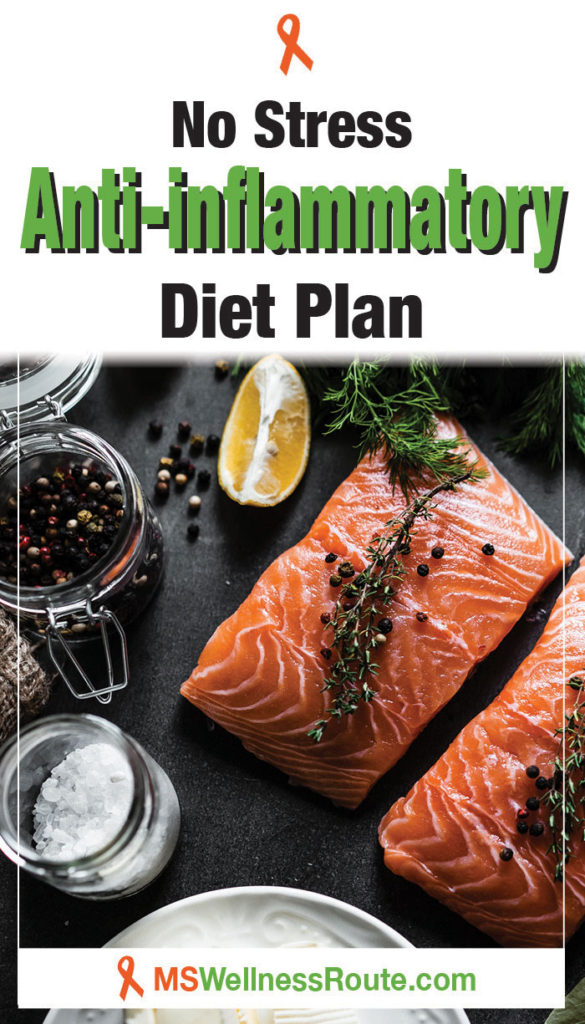
No Stress Anti-inflammatory Diet Plan





